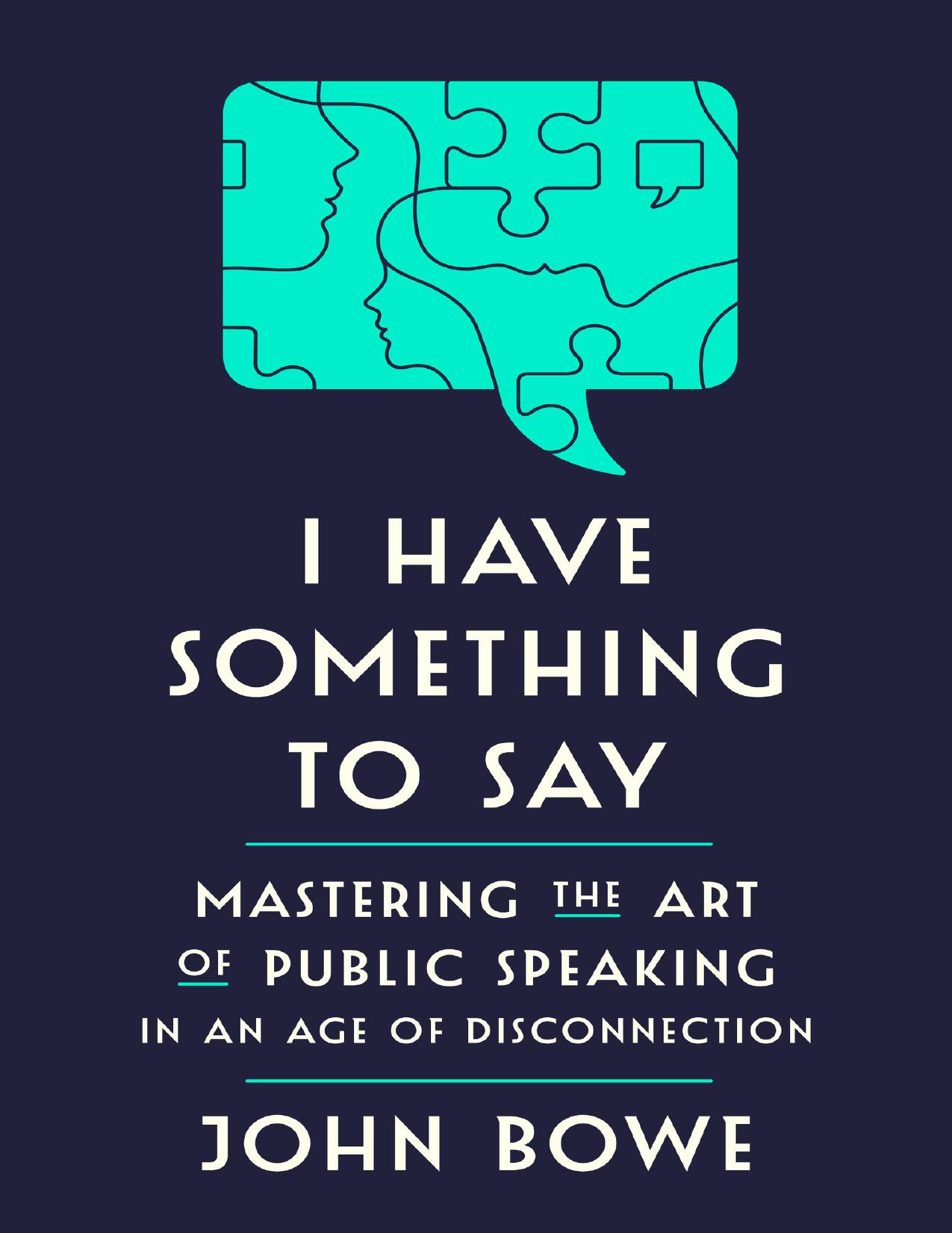I Have Something to Say: Mastering the Art of Public Speaking in an Age of Disconnection by John Bowe

Author:John Bowe [Bowe, John]
Language: eng
Format: epub, pdf
Tags: self help
ISBN: 9780593133163
Google: hK2-DwAAQBAJ
Amazon: 1400062101
Publisher: Random House
Published: 2020-08-11T04:00:00+00:00
Of these the most important—by a millionfold—is ethos: character.
In real life, “character” refers to our bona fide moral qualities—the stuff people know about us, our reputations, and so on. In public speaking, however, the term refers purely to how people perceive us. This includes our “genuine self” insofar as our audience knows who we are, but it also includes the degree of credibility we create through the competence with which we present ourselves and our information.
Suppose you’re on a stage. You have a message. It’s awesome, urgent, and 100 percent true. But is it clearly organized? Is it expressed with words and examples your audience can understand and relate to? Are you audible? Are you offering too much or too little detail or talking too fast or talking with an accent or wearing preposterous earrings or mentioning Harvard too many times or doing something slightly gross with your upper lip that distracts from the 100 percent true and urgent information you’re trying to share? Are you pretty? Do you have a weird haircut? Do you not have a weird haircut while speaking to an audience of people who mistrust speakers who don’t have weird haircuts? If you have failed to adjust and align any of these stylistic aspects of your delivery to the needs and expectations of your audience—in other words, if you have failed to connect with them as well as you possibly can—do you really think they’re capable of hearing your message with undivided attention? How well do you listen when you’re talking to someone who has staggeringly bad breath? How well do you listen to someone who’s shockingly good-looking?
You might think—as reasonable people do—that substance is (and should be) more important than style. You might think that it’s “bad” if style trumps substance, or that only gullible, superficial people would ever fall for such a thing. Aristotle’s point, to put it crudely, is: too bad. Regardless of our audience’s intelligence or education, wrote Aristotle, “character is the controlling factor in persuasion.” Aristotle complains, more than once in his treatise, that in a perfect world people would make decisions based on facts. The wisdom of the Ars Rhetorica, however, is in laying forth a prescription for dealing with the world as it is, not as we wish it were. And Aristotle’s painful point is that being right, being smart, and having great facts won’t carry the day when you’re trying to reach people who are different from you.
Why do horrible, deceptive, blatantly awful politicians seem so often to win elections? Is it because voters are dumb? Or is it equally, to channel Aristotle, because nice, smart, thoughtful people—you there, reader—remain aloof to the imperative that we must meet people on their level, not our own, and speak in ways they can embrace and understand? For the author of the Ars Rhetorica, the answer—and, in fact, the definition of what it means to be smart in the arena of public speaking—was dauntingly clear:
Things that are true and
Download
I Have Something to Say: Mastering the Art of Public Speaking in an Age of Disconnection by John Bowe.pdf
This site does not store any files on its server. We only index and link to content provided by other sites. Please contact the content providers to delete copyright contents if any and email us, we'll remove relevant links or contents immediately.
Cecilia; Or, Memoirs of an Heiress — Volume 1 by Fanny Burney(31333)
Cecilia; Or, Memoirs of an Heiress — Volume 3 by Fanny Burney(30934)
Cecilia; Or, Memoirs of an Heiress — Volume 2 by Fanny Burney(30889)
The Lost Art of Listening by Michael P. Nichols(6474)
We Need to Talk by Celeste Headlee(4870)
Asking the Right Questions: A Guide to Critical Thinking by M. Neil Browne & Stuart M. Keeley(4576)
On Writing A Memoir of the Craft by Stephen King(4214)
Dialogue by Robert McKee(3582)
I Have Something to Say: Mastering the Art of Public Speaking in an Age of Disconnection by John Bowe(3516)
Pre-Suasion: A Revolutionary Way to Influence and Persuade by Robert Cialdini(3414)
Elements of Style 2017 by Richard De A'Morelli(2945)
The Book of Human Emotions by Tiffany Watt Smith(2772)
Good Humor, Bad Taste: A Sociology of the Joke by Kuipers Giselinde(2557)
Name Book, The: Over 10,000 Names--Their Meanings, Origins, and Spiritual Significance by Astoria Dorothy(2491)
Fluent Forever: How to Learn Any Language Fast and Never Forget It by Gabriel Wyner(2446)
The Grammaring Guide to English Grammar with Exercises by Péter Simon(2394)
Why I Write by George Orwell(2359)
The Art Of Deception by Kevin Mitnick(2298)
Don't Sleep, There Are Snakes by Daniel L. Everett(2217)
